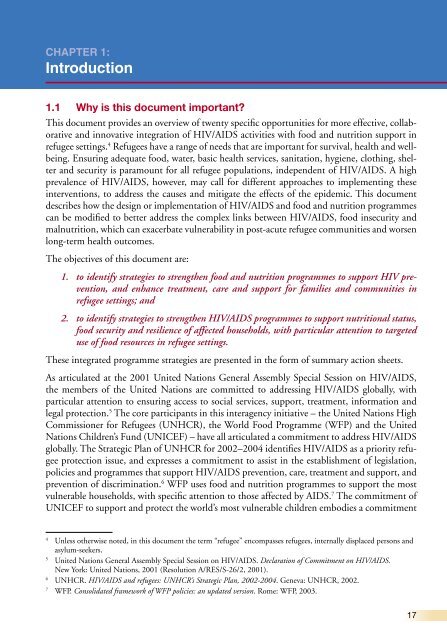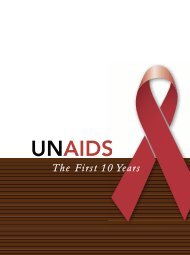Integration of HIV/AIDS activities with food and nutrition support in ...
Integration of HIV/AIDS activities with food and nutrition support in ...
Integration of HIV/AIDS activities with food and nutrition support in ...
You also want an ePaper? Increase the reach of your titles
YUMPU automatically turns print PDFs into web optimized ePapers that Google loves.
CHAPTER 1:<br />
Introduction<br />
1.1 Why is this document important?<br />
This document provides an overview <strong>of</strong> twenty specific opportunities for more effective, collaborative<br />
<strong>and</strong> <strong>in</strong>novative <strong>in</strong>tegration <strong>of</strong> <strong>HIV</strong>/<strong>AIDS</strong> <strong>activities</strong> <strong>with</strong> <strong>food</strong> <strong>and</strong> <strong>nutrition</strong> <strong>support</strong> <strong>in</strong><br />
refugee sett<strong>in</strong>gs. 4 Refugees have a range <strong>of</strong> needs that are important for survival, health <strong>and</strong> wellbe<strong>in</strong>g.<br />
Ensur<strong>in</strong>g adequate <strong>food</strong>, water, basic health services, sanitation, hygiene, cloth<strong>in</strong>g, shelter<br />
<strong>and</strong> security is paramount for all refugee populations, <strong>in</strong>dependent <strong>of</strong> <strong>HIV</strong>/<strong>AIDS</strong>. A high<br />
prevalence <strong>of</strong> <strong>HIV</strong>/<strong>AIDS</strong>, however, may call for different approaches to implement<strong>in</strong>g these<br />
<strong>in</strong>terventions, to address the causes <strong>and</strong> mitigate the effects <strong>of</strong> the epidemic. This document<br />
describes how the design or implementation <strong>of</strong> <strong>HIV</strong>/<strong>AIDS</strong> <strong>and</strong> <strong>food</strong> <strong>and</strong> <strong>nutrition</strong> programmes<br />
can be modified to better address the complex l<strong>in</strong>ks between <strong>HIV</strong>/<strong>AIDS</strong>, <strong>food</strong> <strong>in</strong>security <strong>and</strong><br />
mal<strong>nutrition</strong>, which can exacerbate vulnerability <strong>in</strong> post-acute refugee communities <strong>and</strong> worsen<br />
long-term health outcomes.<br />
The objectives <strong>of</strong> this document are:<br />
1. to identify strategies to strengthen <strong>food</strong> <strong>and</strong> <strong>nutrition</strong> programmes to <strong>support</strong> <strong>HIV</strong> prevention,<br />
<strong>and</strong> enhance treatment, care <strong>and</strong> <strong>support</strong> for families <strong>and</strong> communities <strong>in</strong><br />
refugee sett<strong>in</strong>gs; <strong>and</strong><br />
2. to identify strategies to strengthen <strong>HIV</strong>/<strong>AIDS</strong> programmes to <strong>support</strong> <strong>nutrition</strong>al status,<br />
<strong>food</strong> security <strong>and</strong> resilience <strong>of</strong> affected households, <strong>with</strong> particular attention to targeted<br />
use <strong>of</strong> <strong>food</strong> resources <strong>in</strong> refugee sett<strong>in</strong>gs.<br />
These <strong>in</strong>tegrated programme strategies are presented <strong>in</strong> the form <strong>of</strong> summary action sheets.<br />
As articulated at the 2001 United Nations General Assembly Special Session on <strong>HIV</strong>/<strong>AIDS</strong>,<br />
the members <strong>of</strong> the United Nations are committed to address<strong>in</strong>g <strong>HIV</strong>/<strong>AIDS</strong> globally, <strong>with</strong><br />
particular attention to ensur<strong>in</strong>g access to social services, <strong>support</strong>, treatment, <strong>in</strong>formation <strong>and</strong><br />
legal protection. 5 The core participants <strong>in</strong> this <strong>in</strong>teragency <strong>in</strong>itiative – the United Nations High<br />
Commissioner for Refugees (UNHCR), the World Food Programme (WFP) <strong>and</strong> the United<br />
Nations Children’s Fund (UNICEF) – have all articulated a commitment to address <strong>HIV</strong>/<strong>AIDS</strong><br />
globally. The Strategic Plan <strong>of</strong> UNHCR for 2002–2004 identifies <strong>HIV</strong>/<strong>AIDS</strong> as a priority refugee<br />
protection issue, <strong>and</strong> expresses a commitment to assist <strong>in</strong> the establishment <strong>of</strong> legislation,<br />
policies <strong>and</strong> programmes that <strong>support</strong> <strong>HIV</strong>/<strong>AIDS</strong> prevention, care, treatment <strong>and</strong> <strong>support</strong>, <strong>and</strong><br />
prevention <strong>of</strong> discrim<strong>in</strong>ation. 6 WFP uses <strong>food</strong> <strong>and</strong> <strong>nutrition</strong> programmes to <strong>support</strong> the most<br />
vulnerable households, <strong>with</strong> specific attention to those affected by <strong>AIDS</strong>. 7 The commitment <strong>of</strong><br />
UNICEF to <strong>support</strong> <strong>and</strong> protect the world’s most vulnerable children embodies a commitment<br />
4 Unless otherwise noted, <strong>in</strong> this document the term “refugee” encompasses refugees, <strong>in</strong>ternally displaced persons <strong>and</strong><br />
asylum-seekers.<br />
5 United Nations General Assembly Special Session on <strong>HIV</strong>/<strong>AIDS</strong>. Declaration <strong>of</strong> Commitment on <strong>HIV</strong>/<strong>AIDS</strong>.<br />
New York: United Nations, 2001 (Resolution A/RES/S-26/2, 2001).<br />
6 UNHCR. <strong>HIV</strong>/<strong>AIDS</strong> <strong>and</strong> refugees: UNHCR’s Strategic Plan, 2002-2004. Geneva: UNHCR, 2002.<br />
7 WFP. Consolidated framework <strong>of</strong> WFP policies: an updated version. Rome: WFP, 2003.<br />
17

















